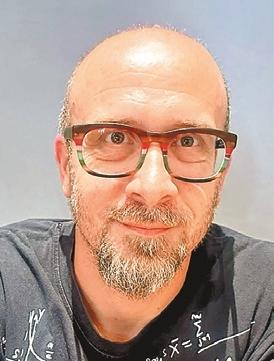
Kang Wei 1434163309@qq.com LIVING and working in a foreign country can be challenging, yet for Italian Anilo D’Angelo, the positive aspects undoubtedly outweigh any hurdles. Reflecting on his decision to relocate to Shenzhen 15 years ago, D’Angelo said that he has never harbored a moment of regret, describing his experience in this vibrant city as “a real eye-opener.” “If you are open-minded, you have the opportunity to learn something new. Even if specific insights elude you, there’s still the joy of listening to fascinating stories or observing the diverse facets of Shenzhen and the varied perspectives of its residents,” he said. Hailing from a small village in southern Italy, D’Angelo’s initial impression of the Chinese people was that they were nice, hard-working people. “In my village of 5,000 people, there are two big Chinese shops that operate nearly round the clock. The shop owners’ children could always be seen either helping their parents or focusing on their studies,” the Italian said. According to D’Angelo, Chinese people’s priorities seem to revolve around “establishing successful businesses, nurturing their families, ensuring a high-quality education for their children, and earning enough to lead a decent and comfortable life.” His years in Shenzhen further reinforced his view of the Chinese as hardworking individuals. “Wherever they live, Chinese people consistently share a common trait — they are hard workers,” he remarked, evidently amused by this “insightful observation” of his. D’Angelo shared with Shenzhen Daily an anecdote from his remote work period during the COVID-19 pandemic, where a supplier, despite being on maternity leave, responded to his WeChat message in the middle of the night. “It was around 3 a.m. in China, and she replied to my message while breastfeeding her baby!” D’Angelo recalled with amazement. In Italy, you don’t open the computer or check messages on the phone while on holiday, he explained. “If you work for yourself, maybe you do it. But if you work for a company, maternity leave is maternity leave.” Returning to Shenzhen as the chief representative of an Italian company after three years, D’Angelo said he has come to appreciate some of the “Chinese ways of working.” He cited his Chinese colleagues’ tendency to approach problem-solving in a seemingly roundabout way that eventually led to quicker resolutions. “I have learned to step back and let them deal with the problems their way,” he said. Some people recognize China as a relationship-oriented society, where guanxi, or interpersonal connections, hold significant importance. D’Angelo readily conceded that a lot of business is indeed done over dinner. However, he argued that the notion suggesting one must get drunk for good business is outdated. According to the Italian, the drinking culture during business dinners in China has evolved over the years, witnessing a shift away from the emphasis on heavy drinking. “Many of my suppliers and clients, particularly among the younger generations, no longer insist on heavy alcohol consumption. Some of them don’t drink at all. So it’s not true that you have to get drunk to do good business in China. Not from what I’ve seen.” Prolonged exposure to a different culture can foster a sense of understanding and tolerance. In D’Angelo’s case, he said he no longer takes offense when people make comments about his appearance, such as “you are losing hair” or “you are getting fatter.” He now knows that Chinese people can be very straightforward sometimes, and his Chinese friends were just stating things as a matter of fact without any judgment attached. “They don’t mean to be rude,” he said. Certainly, his adaptation to the Chinese culture comes with some constraints. Even to this day, D’Angelo said he still finds it perplexing to see supervisors or bosses issuing directives during social outings, instructing subordinates to fetch beers, buy cigarettes, or settle bills, as if the informal setting were an extension of the workplace. “You are supposed to be equals outside of workplaces,” he said. “In Italy, I may comply out of respect if someone is older than me. You don’t give me orders.” D’Angelo wished he had dedicated more time to learning Chinese. “If I were fluent in the language, I could have fostered deeper connections with the local community,” he said. “I would have had the opportunity to engage meaningfully with some elderly people I met on the street, asking them to tell me something about China where they grew up, so that I don’t have to rely solely on history books to know about China’s past.” | 
